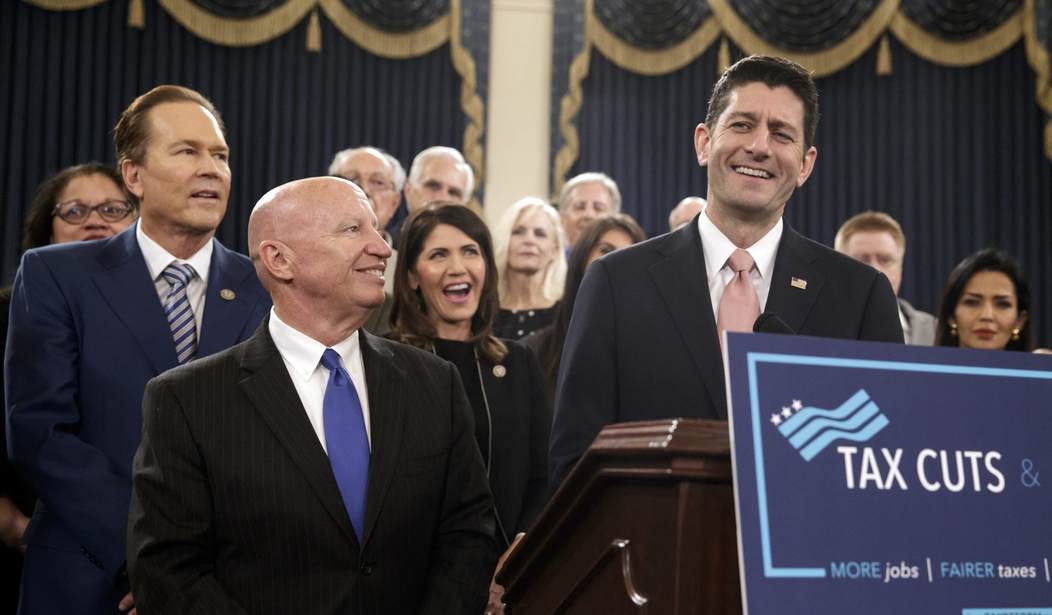WASHINGTON — The Republican tax reform plan passed out of the House Ways and Means Committee on a party-line vote today, setting the stage for a floor vote in the House next week.
The GOP plan would create individual tax rates of 12 percent, 25 percent and 35 percent, and maintain the 39.6 percent rate on the highest-income Americans. The standard deduction would be increased from $6,350 to $12,000 for individuals and $12,700 to $24,000 for married couples; many popular “special-interest” deductions would be scrapped, though.
The chance of the legislation passing as written is slim, as Senate Republicans just introduced their own version of tax reform and leaders are already acknowledging that, if it passes in the upper chamber, the bill would go to conference.
House GOPs found opposition, though, at the U.S. Conference of Catholic Bishops, who argued in a letter to lawmakers Thursday that the Tax Cuts and Jobs Act of 2017 “contains many fundamental structural flaws that must be corrected” and “as currently written, the proposal is unacceptable.”
The letter was written by Bishop Frank J. Dewane of Venice, Fla., who leads the USCCB Committee on Domestic Justice and Human Development, Bishop Oscar Cantú of Las Cruces, N.M., who chairs the Committee on International Justice and Peace, and Bishop George V. Murry, SJ of Youngstown, Ohio, who heads the Committee on Catholic Education.
“This proposal appears to be the first federal income tax modification in American history that will raise income taxes on the working poor while simultaneously providing a large tax cut to the wealthy,” they wrote, citing the Joint Committee on Taxation’s finding that by 2023, and again in 2025, the tax plan will raise taxes on those making between $20,000 and $40,000 per year. Taxes for those earning between $10,000 and $20,000 would hike in 2025; the federal poverty line is $12,228 for one person, and $24,339 for a two-parent family with two children.
“Nearly one in three Americans live in a family with income below 200% of the poverty line. Meanwhile, average taxpayers who make over $1 million experience dramatic tax cuts for the same periods,” the bishops wrote. “No tax reform proposal is acceptable that increases taxes for those living in poverty to help pay for benefits to wealthy citizens.”
They also objected to the elimination of the Work Opportunity Tax Credit, student loan and tuition deductions, the disability retirement tax credit, the deduction for state and local income and sales taxes, the deduction for employee business expenses, and the moving expenses deduction.
“Expanded access to schools of choice is a positive step in this legislation, and we would encourage Congress to go even further by empowering more parents in directing their child’s education. We also appreciate that the legislation recognizes unborn children as eligible beneficiaries for parents’ 529 education savings account contributions,” the bishops continued. “However, this tax plan places new and unreasonable burdens on families, especially those who welcome life or experience serious hardships.”
They objected to the elimination of the adoption tax credit, something restored in the Senate plan, telling Congress members that the “savings to society from children finding loving homes is well beyond any revenue lost due to the credit and exclusion.”
Larger families, the bishops noted, would end up paying more with the elimination of the personal exemption, and they objected to elimination of the out-of-pocket medical expenses deduction, tax incentives to employers to provide dependent care assistance or child care, tuition reduction for children of teachers,and mortgage tax credit certificates.
“Other aspects of the plan also have consequences for families,” the letter added. “By creating stricter rules around parents’ social security numbers, the plan makes it more difficult for immigrant taxpayers to receive the Child Tax Credit or the Earned Income Tax Credit for their families, or to receive assistance in seeking advancement through education.”
“Pope St. John XXIII wrote that a progressive tax code is required by ‘justice and equity.’ The ‘Unified Framework,’ upon which this tax plan was based, promised that any new tax code would be ‘at least’ as progressive as the present code. This plan breaks that promise…. Rather than exploring even modest reductions to these dramatic cuts for the wealthiest, the bill raises taxes on the vulnerable and creates a strong incentive to cut the social safety net.”
Further cuts “will make the charitable deduction increasingly a benefit only available to high income families,” the bishops added. “The tax code should encourage voluntary association, mutual aid, and a culture of giving, helping rather than hurting groups that will be asked to do more for the poor in the days ahead. Similarly, this plan will lower the value of affordable housing and community revitalization incentives. Public-private partnerships that benefit the poor and the greater community should not be discouraged.”
The House GOP tax plan, they concluded, “must be changed for the sake of families—the bedrock of our country—and for those struggling on the peripheries of society who have a claim on our national conscience.”
House Speaker Paul Ryan (R-Wis.), who is Catholic, said at a Thursday news conference that the GOP plan “actually really helps improve people’s lives.”
“We’re actually letting people keep more of their own money. We’re cleaning out the loopholes of the tax code, and having a fairer tax system. So we’re going to have faster economic growth, bigger paychecks, fairer taxes,” he said. “…This is an economic growth bill. This is a middle-income fairness bill.”
Asked about elimination of the adoption credit, Ryan referred the question to the Ways and Means Committee.









Join the conversation as a VIP Member